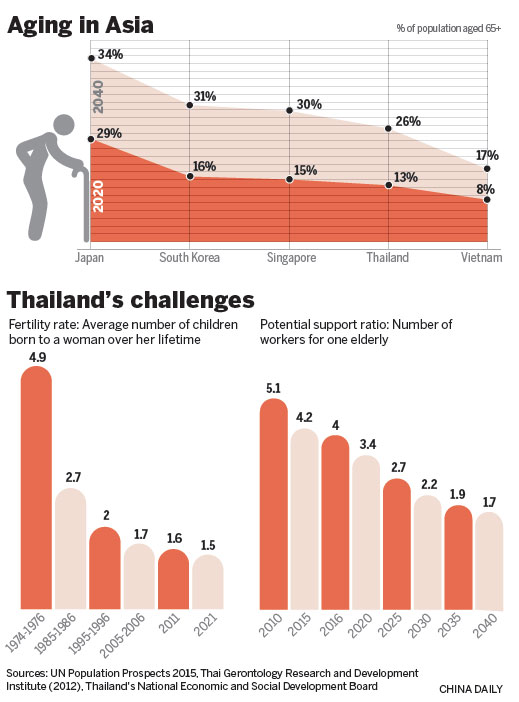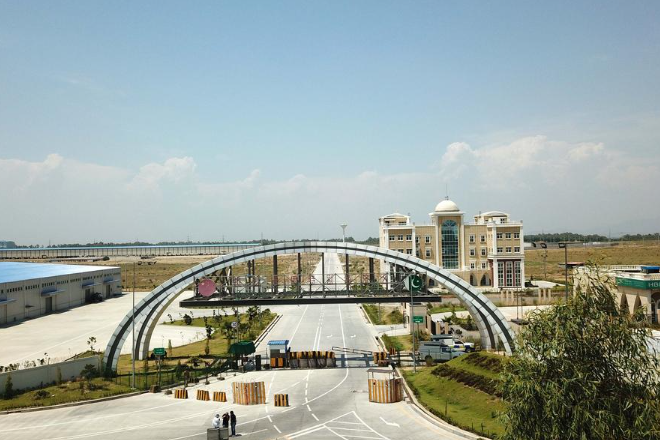Thailand set to face growing demands of elderly transition

Editor's note: Countries and regions worldwide are facing challenges posed by aging populations. This is part of a series in which China Daily looks at the global issue.

Thailand is now among the world's rapidly aging countries, and the rising financial and healthcare needs of the elderly pose a serious challenge to its policymakers.
According to latest figures from the United Nations Population Division, there are 8.6 million people in Thailand who are aged 60 and above. The elderly group accounted for nearly 13 percent of the Thai population as of 2015.
In Southeast Asia, Thailand and Singapore have the highest percentage of elderly people in their population.
Other than the rising number of elderly, what is more concerning is the rapid pace of aging. Thailand will officially become an aged society in 2021, with the elderly accounting for one-fifth of its population, according to the UN.
By 2050, Thailand is forecast to become a "super-aged" society, with elderly people accounting for more than 35 percent of the population.
"Thailand has a very short time frame to prepare (for an aged society). That's our main challenge," said Amornrat Apinunmahakul, assistant professor at the Bangkok-based Graduate School of Development Economics, National Institute of Development Administration.
According to the Bangkok-based Thailand Development Research Institute think tank, the government has to prepare for a huge rise in public health expenditure over the next 15 years as more elderly people need healthcare support.
The government allocated 330 billion baht ($10.44 billion) for the public health sector in 2018. But the research institute estimated that annual healthcare spending will rise to 1.4 trillion baht to meet the needs of an aging society.
Thailand has about only a dozen institutional old-age homes supported by the government, according to London-based nonprofit HelpAge International.
Thailand also has a universal pension scheme but the amount may not be enough for the needs of the elderly, Amornrat said.
Under the Old Age Allowance program, the government extends a monthly subsidy of 600 baht to 1,000 baht to the elderly, which is way below the national poverty level of 3,000 baht a month.
But Thailand's economy has to grow more to finance more programs for the elderly, Amornrat said.
"The elderly have health problems and limited capacity to earn. If they don't get enough assistance from the government or healthcare services, their situation will become worse," Amornrat said.
Changing family dynamics, which have seen younger Thais moving from towns to cities to get higher-paying jobs, are also a concern for the elderly, said Usa Khiewrord, HelpAge International's program manager for the East Asia-Pacific region.
"There are different means of providing care like (giving) emotional support, not just healthcare. But (younger Thais) have to leave their elderly parents so that they can earn the money to support their parents," she said.
The UN Economic and Social Commission for Asia and the Pacific said the pace of aging is more rapid in the developing Asian countries and occurring at a much earlier stage of development compared to more industrialized economies.
France took 115 years to move from an aging to an aged society, the commission noted. When France became an aged society in 1975, it had a per capita GDP of $12,514 (computed based on current prices). This contrasts with Thailand which has only 22 years to make the transition and had a per capita GDP of $6,593.82 in 2017, according to the commission and World Bank data.
But the outlook is not all bleak.
Bussarawan Teerawichitchainan, deputy director at the Centre for Family and Population Research at the National University of Singapore, said Thailand has implemented programs that support the elderly despite its relatively limited resources as a middle-income economy.
"Thailand (is one of the few) middle-income countries that has universal health coverage," Bussarawan said.
She said that despite several changes in the Thai government, the concerns of the elderly remain one of the authorities' top priorities.
Thailand has comprehensive national policies on the elderly as indicated by the adoption of the Second National Plan for Older Persons covering 2002-21, the prominence of aging issues in the 2012-2016 National Economic and Social Development Plan, and the establishment of the Department of Older Persons in 2015, Bussarawan said.
Taking care of the needs of the elderly should be a shared responsibility among various stakeholders, Amornrat said.
"Taking care of old people is not just the responsibility of the central government. It is also the responsibility of the family, the local community and the local government as well," she said.
Amornrat voiced support for the government's initiative to implement the Home Care Service Volunteers for the Elderly program - a nationwide community-based healthcare program that was established in 2003.
Under the program, local community members were trained by the Ministry of Social Development and Human Security to help provide in-home care services to the elderly.
The program is suitable for Thailand as it is cheaper and more attuned to the needs of Thai elderly, Bussarawan said.
The elderly might be too sick to go to the hospital for treatment even if medical services are free, she said.
"Elderly people have long-term healthcare needs and are usually homebound. The government and local community are trying to help people to stay at home," she said.
Having someone from the local community act as caregivers will assure family members that their parents are in good hands, Bussarawan said.

































